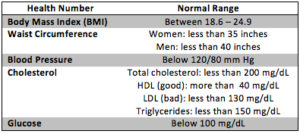Be your best – eat healthy, stay active, minimize stress, get good sleep and know your health numbers. Track health indicators like your body mass index (BMI), blood pressure, cholesterol and glucose and know what’s normal or baseline for you so when changes occur, you’ll know to take action to help prevent health conditions like diabetes, heart disease, stroke and more.
What’s your baseline?
Know your numbers for these important health indicators:
- Weight and BMI: Your BMI is determined based on your height and weight with a healthy BMI falling between 18 and 25. Use the National Institutes of Health BMI calculator to determine your BMI. If it’s 25 or higher, you need to change your eating habits and activity level to lower your risk of heart disease, diabetes, some cancers and more. With the rise in obesity, North Memorial Health clinics are very focused on helping their patients address weight issues at every visit with added diet and exercise support.
- Waist circumference: Excessive amounts of abdominal fat are linked to an increased risk of diabetes and heart disease. Women should strive for a waist circumference of less than 35 inches and men should be less than 40 inches, according to the U.S. Department of Health and Human Services.
- Blood pressure is one of the strongest markers for your risk of heart disease and stroke. It measures the pressure that the blood exerts in your vessels. The top (systolic) number measures the pressure when the heart beats or contracts and the bottom (diastolic) number measures between beats, when the heart is relaxing. Readings below 120/80 are considered normal for most adults without chronic conditions. If you notice variation or an elevation in your blood pressure over time, see your provider.
- Cholesterol levels, along with your blood pressure, age and other indicators, provide a picture of your risk for heart disease and stroke. Your body needs some cholesterol but too much can cause a buildup of plaque in your arteries making it hard for blood to get to your heart. Strive to keep your low-density lipoprotein (LDL), or bad cholesterol, below 130 milligrams per deciliter (mg/dL) of blood. High-density lipoprotein (HDL), or good cholesterol, should be above 40 mg/dL and the higher the better. Your total cholesterol should be below 200 mg/dL. Your doctor will determine when interventions are needed based on your ratio of bad to good cholesterol, your family history and how far outside the normal range your cholesterol levels fall.
- Glucose or blood sugar is used to diagnose diabetes. Your fasting glucose (when you have not eaten for 12 hours) should be below 100 mg/dL. Critical levels over 126 are in the diabetic range and your doctor will confirm this with additional testing.
While we inherit some disease risks from our family, most chronic disease risk is in the lifestyle we lead including our diet, activity and stress levels, smoking history and sleep patterns. There are a variety of other screening tests your doctor may perform based on your health history and symptoms.
Below is a quick reference of what these vital health numbers are and the normal range for each. If you are over the age of 20, you should get your cholesterol and glucose e checked at least once every five years to ensure you’re within normal ranges.



